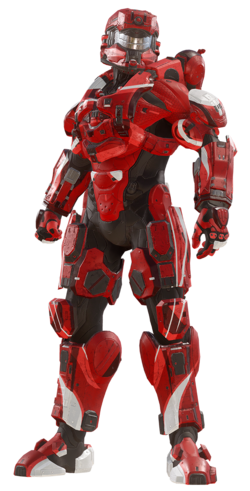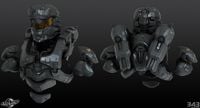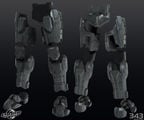ENFORCER-class Mjolnir
From Halopedia, the Halo wiki
| Enforcer | |
|---|---|

| |
| Production overview | |
|
Manufacturer(s): |
|
|
Testing site(s): |
|
|
Type: |
|
|
Role(s): |
Remote base security detail[2] |
| Technical specifications | |
|
Feature(s): |
|
Template:Article Quote ENFORCER-class Mjolnir is a variant of the MJOLNIR Powered Assault Armor [GEN2] manufactured by Imbrium Machine Complex.[2]
Overview
Specifications
The helmet has a cycloptic field assessing module for tactical awareness. The chest has twin L-4 component feeds, and the reactor pack has an open-line channel modifier for power conservation.[1]
The suit includes hardware-accelerated VISR enhancements for infiltrating and co-opting local battlenets to aid in target-location, target-tracking, and counter-surveillance. [3]
Development history
The Enforcer armor was manufactured by the Imbrium Machine Complex in the Anakara Resiliency Chamber. The armor is designed to provide benefits to those engaged in defensive maneuvers, those operating from a localized site, or those sent into enemy-held locations.[1]
Before May 2553 a iteration of the armor passed tests per the Ankara Field Stricture BL58-0 and was approved by the UNSC Ordnance Commission.[1]
Usage
It is mainly utilized by Spartans who operate on remote bases with a native battle network or a co-opted enemy network.[1]
Input from the helmet-mounted cycloptics is often fed directed into the battlenet for online reviews by intelligence specialists and battlespace management AIs.[3]
As of May 2553, all ZULU-Level classified ONI sites required security details to wear fully operable Enforcer-class armor, as tested under Ankara Field Stricture BL58-0 and approved by the Ordnance Commission.[4]
In-game information
Halo 4
Available skins: Tribal (TRBL), and Tracer (TRCR)
Default unlock: Obtained by achieving Spartan Rank 50.
Tribal unlock: Complete the Mounted Turret - Master commendation.
Tracer unlock: Purchase the Champions Bundle. This is not usable in Spartan Ops.
- Description: Developed in Ankara, this is the primary armor set for remote base security detail.
MCC descriptions
- Helmet description: Popular with Spartans assigned to base security details.
- Shoulder description: Modular left/right spaulder from Enforcer-class armor.
- Chest description: Cleared for operations in ZULU-level SCIFs.
Halo 5: Guardians
Available skins: Strongarm
Default unlock: Uncommon REQ card
Strongarm unlock: Rare REQ card
- Helmet description: Input from the ENFORCER's helmet-mounted cycloptics is often fed directed into the battlenet for online reviews by intelligence specialists and battlespace management AIs.
- Body description: ENFORCER-class armor includes hardware-accelerated VISR enhancements for infiltrating and co-opting local battlenets to aid in target-location, target-tracking, and counter-surveillance.
In Halo 5: Guardians due to the "Body" having a predefined customisation this armor set permanently has the following parts from Halo 4:
- Body: Enforcer
- Shoulders: Enforcer
- Forearms: Ricochet
- Legs: Over-locking
Trivia
- In Halo 5: Guardians the Strider armor uses the body of the Enforcer armor but features different leg armor.
- The Enforcer armor's helmet has a close resemblance to the Hoplite helmet from Halo 2: Anniversary.
- The Enforcer armor's attributes are similar to the H-295 Forward Observer Module but with the added ability of co-opting networks, making the suit far more versatile than its hand-held counterpart.
Gallery

|
Browse more images in this article's gallery page. |
An Enforcer-clad Spartan-IV using the Blood of Suban on Urban.
Halo 4 skins
Halo 5: Guardians skins
Halo 5: Guardians REQ cards
List of appearances
- Halo 4 (First appearance)
- Halo 5: Guardians
Sources








